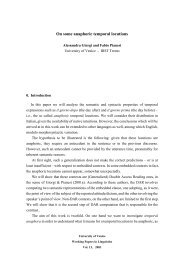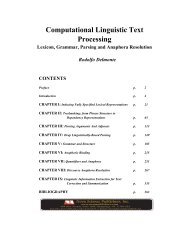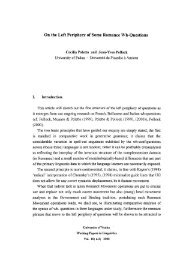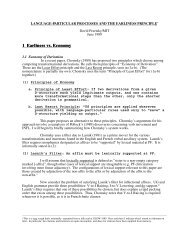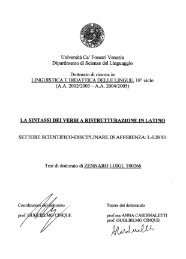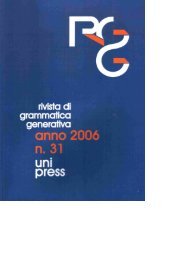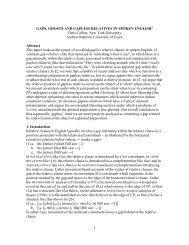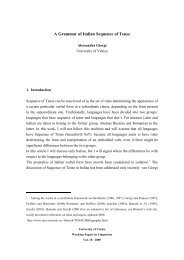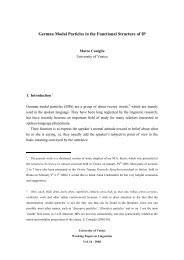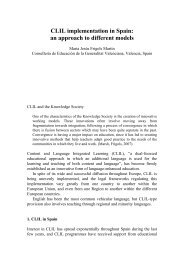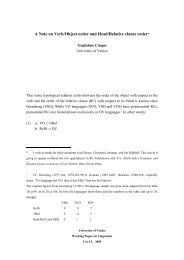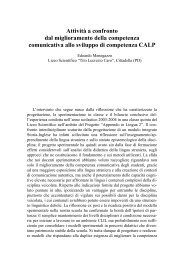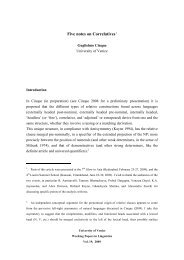Chinese relative clauses: restrictive, descriptive or appositive? - Lear
Chinese relative clauses: restrictive, descriptive or appositive? - Lear
Chinese relative clauses: restrictive, descriptive or appositive? - Lear
Create successful ePaper yourself
Turn your PDF publications into a flip-book with our unique Google optimized e-Paper software.
FRANCESCA DEL GOBBO<br />
(37) [Mei-ge xuesheng]i dou yuanliang (na-ge)[RC cengjing shanghai-guo<br />
every-CL student all f<strong>or</strong>gives that-CL f<strong>or</strong>merly insult-GUO<br />
tai de] Lisi.<br />
him DE Lisi<br />
lit. ‘Every student f<strong>or</strong>gives Lisi who insulted him.’<br />
(38) [Mei-ge laoshi]i dou jiaoxun [RC meiyou zunzhong tai de] women.<br />
every-CL profess<strong>or</strong> all scold not respect him DE us<br />
lit. ‘Every profess<strong>or</strong> scolded us who disrespected him.’<br />
M<strong>or</strong>eover, the insertion of a sentential adverb of modification yields<br />
ungrammaticality:<br />
(39) *[Shunbian-yi-sheng xihuan yinyue de] Zhangsan changchang qu<br />
by-the-way-one-voice like music DE Zhangsan often go<br />
yinyuehui.<br />
concert<br />
lit. ‘Zhangsan, who by the way likes music, often goes to concerts.’<br />
Finally, Gi<strong>or</strong>gi (1984), on the basis of the behavi<strong>or</strong> of the long-distance<br />
anaph<strong>or</strong> proprio, ‘self’, in Italian, observes that if the long-distance anaph<strong>or</strong><br />
is inside an <strong>appositive</strong> <strong>relative</strong> clause, it can only be bound by the ‘head’ of<br />
the <strong>relative</strong> clause. If instead it is inside a <strong>restrictive</strong> <strong>relative</strong> clause, it can be<br />
bound both by the ‘head’ of the <strong>relative</strong> and by the matrix subject:<br />
(40) Giannii pensa che Marioj, che tj ama la propriaj/*i moglie,<br />
Gianni thinks that Mario that loves the own wife<br />
sia intelligente.<br />
is smart<br />
‘Gianni thinks that Mario, who loves his own wife, is smart.’<br />
In <strong>Chinese</strong>, the long-distance anaph<strong>or</strong>a ziji, ‘self’, can be bound both by the<br />
‘head’ of the <strong>relative</strong> and by the matrix subject:<br />
(41) Zhangsani renwei [RC ai zijij/i de qizi de] Lisij hen congming.<br />
Zhangsan thinks love own DE wife DE Lisi very smart<br />
‘Zhangsan thinks that the Lisi who loves his own wife is smart.’<br />
(42) Zhangsani renwei [RC ai zijij/i de qizi de] taj hen congming.<br />
Zhangsan think love himself DE wife DE him very smart<br />
‘Zhangsan thinks that he who loves his own wife is smart.’<br />
300



